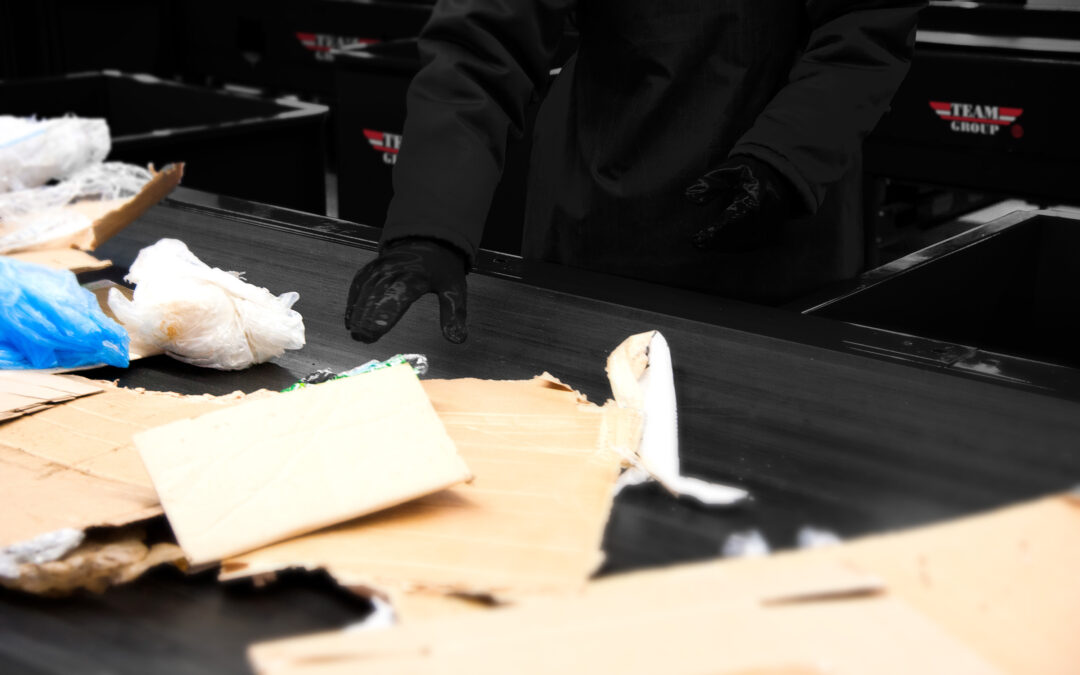In the dynamic landscape of industrial operations, the pursuit of sustainability has become imperative. A key aspect gaining prominence is the concept of zero waste – an ambitious goal that transcends conventional waste management approaches.
As a leading industrial facility maintenance and management company, TEAM Group is dedicated to assisting businesses in their journey toward zero waste, recognizing the multifaceted benefits, both environmental and economic, associated with this shift.
Every year, the world generates 2.01 billion tons of municipal solid waste.
With growing awareness of the need to divert waste from landfills, facilities are embracing the shift towards the “refuse, reduce, reuse, recycle” approach. The spotlight is now on waste generation and innovative strategies for effective waste mitigation.
The 5 Rs of Waste Management
The 5 Rs of waste management represent a list of actions to mitigate and manage waste in an environmentally responsible manner. These principles are often applied to guide individuals, businesses, and communities toward reducing their environmental impact. The 5 Rs are:
- Refuse: The first step is to refuse unnecessary items or products that contribute to waste. In a business context, this can involve evaluating the necessity of certain materials, packaging, or processes. By refusing what is not essential, a business can prevent unnecessary waste generation.
- Reduce: This step involves minimizing the amount of waste generated. Facilities can implement lean manufacturing practices, optimize processes, and use materials more efficiently. By reducing waste at the source, companies contribute to resource conservation and cost savings.
- Reuse: Reusing items or materials extends their lifecycle, reducing the need for new resources. Businesses can incorporate reusable packaging, encourage employees to reuse office supplies, and implement systems for reusing materials within their processes. This not only decreases waste but also promotes a culture of sustainability.
- Recycle: Recycling involves the collection and processing of materials to create new products. Businesses can set up comprehensive recycling programs for various materials, such as paper, plastics, metals, and electronics. By incorporating recycling practices, a company helps divert waste from landfills and supports the creation of a circular economy.
- Rot (Composting): Composting involves the decomposition of organic waste into nutrient-rich compost. While not all businesses may have organic waste, those in the food industry or with green spaces can implement composting programs. This reduces the amount of organic waste sent to landfills, benefiting the environment and supporting sustainable practices.
A new ending for cigarette butts?
GreenMinded, an association founded by an IMT student engineer and former smoker in 2016, focuses on addressing the environmental issue of cigarette butt pollution. Through the installation of “Bornes to Recycle” in urban areas and corporate smoking zones, GreenMinded aims to provide a recycling solution, backed by successful experiments that show a significant reduction in littered cigarette butts near the units.
By refusing unnecessary items, reducing waste generation, reusing materials, recycling, and composting when applicable, industrial facilities can move closer to achieving the goal of zero waste. Adopting these principles not only benefits the environment but can also enhance the company’s reputation, reduce costs, and contribute to a more sustainable and resilient business model.
Understanding Zero Waste
Zero waste is a comprehensive approach and set of principles designed to reshape industrial processes, consumption habits, and waste management practices. The primary objective is to minimize, and ideally eliminate, the generation of waste. The ultimate goal is to significantly reduce the reliance on landfills and incineration, promoting sustainable practices that conserve resources and prioritize environmental well-being. Embracing zero waste involves a commitment to sustainable and circular practices, advocating for responsible resource management and a more eco-friendly approach to production and consumption.
At TEAM Group, we view the adoption of zero waste not only as an environmental imperative but as a strategic maneuver capable of delivering significant business benefits.
A zero waste approach conserves natural resources and reduces pollution from extraction, manufacturing, and disposal.
7 Steps Toward Achieving Zero Waste in Your Facility
Embarking on the journey towards achieving zero waste in your facility involves a strategic and comprehensive approach:
- Conduct a Thorough Waste Audit: Lay the groundwork for zero waste by meticulously examining the composition and volume of waste generated within your facility. A waste audit involves a thorough examination of your business’s waste stream. The aim is to identify and quantify the various types of waste produced, including paper, plastic, food, tin, and more. The insights gathered from the audit provide valuable data to pinpoint the biggest sources of waste and empower your business to implement effective reduction strategies.
- Embrace Source Reduction Strategies: Targeting waste at its origin is pivotal. Integrate lean manufacturing practices, optimize production processes, and champion the use of durable and recyclable materials to minimize the generation of waste. This can also include reducing chemical land water usage in cleaning practices. Opting for biodegradable or eco-friendly alternatives is another great way to achieve zero waste. In the past, robot covers were typically crafted from materials like PolyLam (polyester laminate). However, the challenge arose as these covers could only withstand a few washes before accumulating paint, leading to their eventual disposal—often as hazardous waste. Now, innovative plastic robot covers are on the market, boasting a lifespan of up to one year and, more impressively, they are biodegradable down to the last thread and velcro.
- Promote Recycling and Reuse Programs: Establish robust recycling initiatives for various materials, fostering a culture of resourcefulness among employees. Actively encourage the reuse of materials within the facility to maximize their lifecycle.
- Explore Waste-to-Energy Technologies: Incorporate advanced waste-to-energy technologies to convert specific waste types into valuable energy resources. This not only diminishes reliance on traditional energy sources but also contributes to a more sustainable and diversified energy portfolio.
- Employee Training and Engagement: The success of any zero waste initiative hinges on active employee involvement. Conduct awareness sessions emphasizing the significance of waste reduction and encourage employees to play an active role in sustainable practices.
- Continuous Improvement through Data Analysis: Implement data-driven decision-making processes to continually monitor and analyze waste generation patterns. Utilize this information to identify improvement areas and refine waste reduction strategies over time.
- Collaborate with a Facility Management Company: Consider partnering with a forward-thinking facility management company, such as TEAM. Our expertise can further enhance your zero waste efforts, providing tailored solutions and industry insights for a comprehensive and sustainable waste management approach.
Business Benefits of Zero Waste
- Cost Savings through Operational Efficiency: Achieving zero waste often leads to reduced disposal and landfill costs. Additionally, optimizing processes for resource efficiency can result in significant cost savings related to materials and energy consumption.
- Enhanced Corporate Reputation and Brand Value: A commitment to sustainability, including zero waste initiatives, enhances corporate reputation and brand value. This can attract environmentally conscious customers and investors, providing a competitive edge in the market.
- Regulatory Compliance and Risk Mitigation: Adherence to environmental regulations is crucial for industrial facilities. By achieving zero waste goals, businesses not only stay compliant but also mitigate the risks associated with environmental liabilities.
- Access to New Markets and Customers: As sustainability becomes a key consideration for consumers, businesses that demonstrate a commitment to zero waste practices can tap into new markets and attract a broader customer base.
Environmental Benefits of Zero Waste
- Reduction in Greenhouse Gas Emissions: By diverting waste from landfills and promoting recycling, industrial facilities contribute to a significant reduction in greenhouse gas emissions associated with waste decomposition.
- Conservation of Natural Resources: Zero waste practices play a pivotal role in conserving natural resources by minimizing the extraction and processing of raw materials. This contributes to the preservation of ecosystems and biodiversity.
- Protection of Ecosystems from Pollution: Decreasing the amount of waste sent to landfills reduces the environmental impact on surrounding ecosystems. This, in turn, prevents soil and water contamination, safeguarding the health of ecosystems and the communities around them.
- Positive Community Impact: Adopting zero waste practices can positively impact local communities by reducing the burden on landfills, improving air and water quality, and fostering a healthier living environment for residents.
In the world of industrial facilities management, striving for zero waste can lead businesses toward a more sustainable future. TEAM firmly believes that this journey is not just a responsibility but an investment in resilience and long-term success. By comprehensively adopting zero waste principles, industrial facilities can not only minimize their environmental footprint but also unlock substantial cost savings and enhance their overall corporate responsibility.
The transition to zero waste is a strategic imperative, ensuring a cleaner, greener future for the industrial sector and the planet as a whole.
As businesses embark on this transformative path, they not only secure their position as industry leaders but also contribute to a more sustainable and resilient global ecosystem.
Additional Resources
https://www.epa.gov/transforming-waste-tool/how-communities-have-defined-zero-waste
https://www.zerowaste.com/blog/how-to-reach-zero-waste-to-landfill/
https://www.scientificamerican.com/custom-media/scjohnson-transparent-by-design/zerowastefactory/
https://www.greenbiz.com/article/behind-scenes-look-walmarts-zero-waste-program
https://medium.com/@rekart/embracing-zero-waste-paving-the-path-to-a-sustainable-future-df905d7dd8






